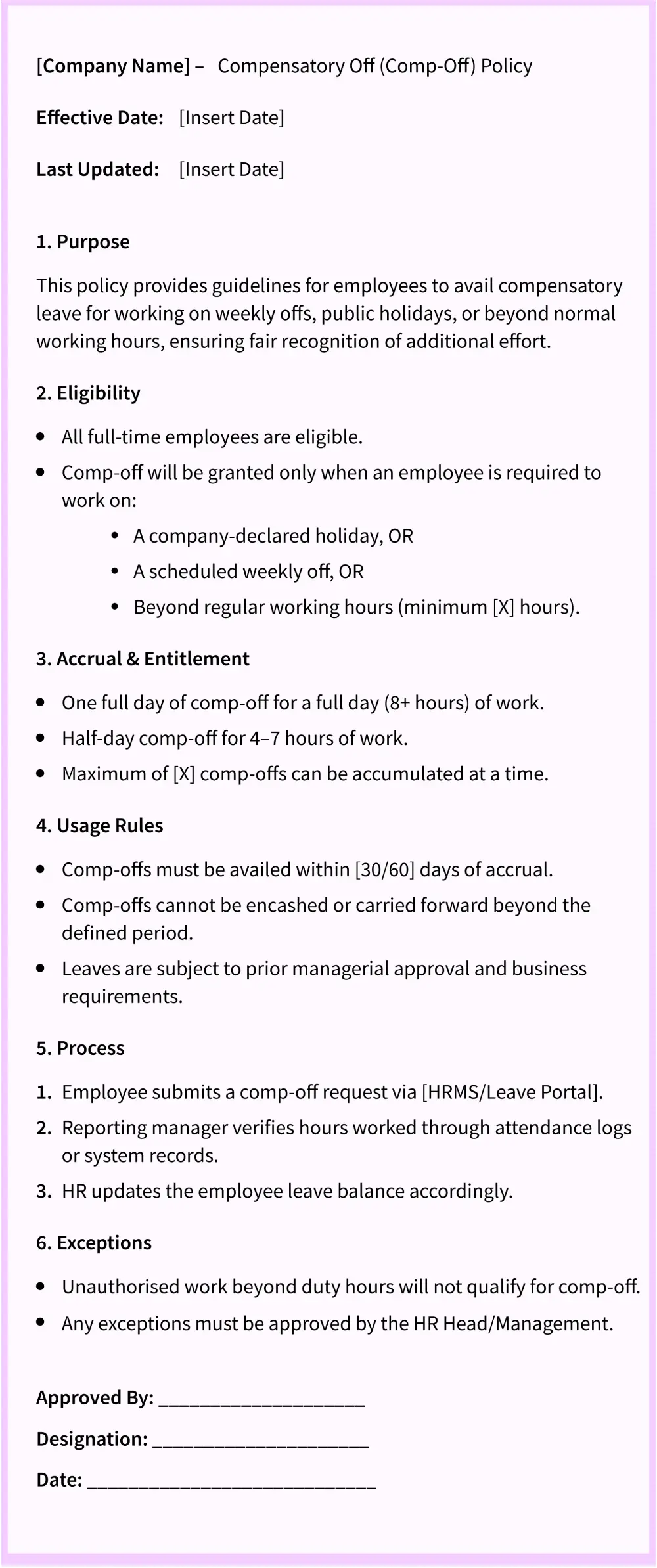Compensatory offs, or Comp Offs, are a type of leave granted to employees who work on their scheduled holidays or rest days. Generally, rather than giving the employees additional payment for the work done as such, most firms choose to grant them a day off at a later date to ensure that they eventually obtain the rest that they are entitled to, whilst also allowing the employer to maintain productivity where possible, without paying high overtime rates.
The basic principles surrounding comp off can vary from company to company and location to location. Generally, the employee must either work on a non-working day or be required to work beyond their normal hours to qualify for a comp off. Companies will typically have limits around when comp off must be used, e.g., in most organizations, after 30 to 90 days, it will expire. Some companies also limit how many comp-offs can be earned or utilized at the same time. Another thing to know is that, typically, supervisors or managers must approve comp off, and it is the responsibility of the employee to describe and define this work.
In India, there is a strong link between labour laws and the company's policy. The Factories Act, 1948, and the various states that have Shops and Establishments Acts stipulate that there are entitlements which mean employees who are required to work on weekly holidays, or public holidays, must be provided a substitute day off within a range of days, normally defined, from the holiday worked. There is generally some mention in the corporate policy on entitlements, approval processes, expiry periods, and that comp offs cannot be cashed out unless allowed by the organization. Thus, the employer and employee have a clearer understanding of how comp off works.
In this blog, we are going to cover everything that you need to know about comp offs - meaning, rules, eligibility, benefits, and how you can have a clear policy for them. We will also explain the difference between comp off and overtime pay, and if comp off can be accrued and/or carried over. Let’s start off by understanding what actually compensatory off is.
What are Compensatory Offs (Comp Off)?
A compensatory off (or comp off) refers to paid leave for employees who work on a holiday or their weekly day off to take another day off in return for the hours put in. Compensatory offs exist so that pay equity makes sense when employees put in extra time outside of their regular work. Instead of getting paid extra money for taking this work time away from their work schedule, the employee receives a day off they can use at a later time. Comp offs are most relevant when it comes to employees working during national holidays, working weekends, or when working on a special project assignment that requires extra hours and effort.
The reason for compensatory offs is to offer a cushion between work and rest, and effort and reward. It is a way for the employee to avoid burnout and feel that their organization values their work and commitment. Comp off is paid leave, so when an employee takes it, they don't lose any salary. They aren't using their vacation time or sick leave. So, when an employee receives a comp off, while it may seem like just an extra day away from work, a compensatory off is a kind of rest and recognition for an employee who has worked extra hours on essential business matters, typically outside the parameters of their core functions.
Nowadays, comp-offs can also help improve employee satisfaction. Knowing there is time off taken for working more hours, employees are more likely to stay motivated and engaged. Comp time can be a helpful resource for employers to manage extra workloads while doing so in a cost-effective manner that manages employee wellness.
Who is Eligible for Compensatory Off?
Eligibility for compensatory time off (commonly referred to as comp off) depends on the policy and defined conditions of the organization. Every employee who is directed to work on a holiday or an off day is entitled to receive compensatory time off. The work performed on that day must have been approved beforehand by a manager or supervisor, and that employee must work the minimum amount of required hours, typically, but not limited to, a full shift, for the comp off to be valid.
Certain organizations may allow comp off for working specifically scheduled half-day shifts according to their internal policy or guidelines. Likewise, temporary staff, freelancers, or consultant staff are typically not entitled to compensatory time off unless the organization has definitive provisions or policies.
Either way, when the organization does establish issues involving the eligibility and conditions of comp off, it should always be established in their leave policy to eliminate any misunderstanding or confusion later.
What are the Rules for Compensatory Offs in India?
Compensatory off is leave granted to employees who work beyond their regular hours, like on holidays, weekends, or during overtime shifts. Here’s a clear and professional summary of Rules for Compensatory Offs in India:

1. Legal Support: There is a legal underpinning for these compensatory offs at the labour law level, as seen in the Factories Act 1948 and the Shops and Establishments Act. The employment laws state that if an employee works on a holiday, the employee must be provided a compensatory day off in the same month or in the subsequent two months.
2. Accrual of Time: Comp off is earned one-for-one. If you take on hours out of your normal schedule, you will take them later, thus showing fair payment for further work even though you didn't receive extra wages.
3. Limit on Hours: Most organizations place a cap on the accrual of comp off at around 240 hours. This prevents excessive leave days from being accrued, ensuring that employees take their deserved time off regularly and helping to balance workload and a healthy work-life balance
4. Usage Period: Comp off generally must be taken within 30 - 90 days from being earned. Limiting the time to take comp off encourages employees to take it promptly, prevents comp off from becoming obsolete, and allows for planning of workloads without large amounts of unplanned absences.
5. Request and Approval: Employees must all submit a formal request for comp off using a format, HR system, or email, as all situations are appraised and authorized formally. This makes sure that each type of comp off is sanctioned, helps managers arrange scheduling or replacements, and avoids disruptions in operations.
6. Minimum Work Thresholds
- If an employee works extra hours before their shift (e.g., 2 hours), they might be eligible for a half-day comp off.
- Working 3-4 extra hours can result in either time off or pay, depending on company policy.
- Working more than 5 hours during weekends or holidays often qualifies for a full day of comp off.
7. Attendance Tracking: Comp off usually requires an employee to be eligible based on verified attendance records, which are generally documented through biometric tracking devices or time-tracking software. Attendance systems can substantiate time worked over the required schedule, take away confusion over what is comp off, and keep the comp off process transparent to the employee and the employer.
How to Implement a Compensatory Off-Policy
This policy sets clear rules for eligibility, accrual, approval, and usage, while keeping the process transparent, compliant with labour laws, and easy for both employees and managers to follow.

1. Set Clear Guidelines: The first step is to have a written policy that states exactly when a comp off can be awarded, how to apply for the comp off, and the eligibility to receive the comp off. The most important thing is to keep it simple and keep the rules logical to follow.
2. Follow Labor Laws: The policy needs to be compliant with local labour laws and guidelines. This is important to avoid becoming entangled in legal matters and to ensure all employees are treated fairly
3. Use a Tracking System: Purchase a competent leave management system or HR software to keep track of comp off applications, approvals, and when it has to be used. You do not want to confuse your documentation records.
4. Communicate with Employees: Informing employees is critical. The effective comp off policy should be communicated in the onboarding process and then made readily accessible to everyone through the company portal or handbook.
5. Train Supervisors and HR Staff: Managers and HR teams need to be trained so they understand the process of approving comp offs equitably and recording comp offs correctly, which promotes internal trust and consistency.
What are the Benefits of Compensatory Offs?
Compensatory offs provide employees with time to recuperate and rest after long shifts, aiding their recovery and work-life balance. They can reduce stress , increase focus and enhance productivity. Comp offs also create fairness, instil trust, and keep employees motivated by offering a flexible work environment where extra effort is rewarded with time off.
Benefits of Compensatory Time Off for Employees
1. Give Employees Extra Time to Rest and Recharge
When employees put in extra hours, comp off provides a timely and well-deserved break. This break helps them recharge their batteries, come back to their work with a fresh mind, and maintain consistent quality without feeling overworked.
2. Work-life Balance
Comp off provides employees the ability to spend time with family, take care of personal issues, or simply rest. This helps employee work-life happiness, which helps employees be more focused and productive when they return.
3. Lower Fatigue and More Energy
Comp off provides regular breaks from work, which helps lessen and avoid certain types of burnouts, as well as avoid work-related stress. Time spent away from work allows employee to take care of their physical health and overall mental well-being, contributing to a more positive and energetic attitude towards their work.
4. A Direct Benefit for Doing Extra Work
Now, instead of waiting to use annual or statutory leave, employees can earn and use their comp off after working additional hours. It allows employees to feel a general sense of fairness and reward and motivates them to give their best when they are needed to do extra work.
Benefits of Compensatory Time Off for Employers
1. More Motivation from Employees
When employees know that they will be recognized for their extra effort and compensated with comp off, they feel valued. This improved feeling leads to improve employee engagement in their work, improved morale, and increased willingness to exert themselves for the benefit of the organization.
2. More Performance and Focus
When employees are well-rested, they can work more productively, with fewer mistakes, and at the same time with more clarity when approaching problems. Comp time gives employees the time to recharge so that they can also increase their level of quality and problem-solve with more innovation.
3. More Trust and Positive Work Environment
Providing comp time shows employees that the organization cares about their well-being and respects their time. When organizational fairness is rewarded, employees feel appreciated, and this leads to improved loyalty, better trust, and a positive, supportive work environment that employees feel inspired to give 100%.
4. Provides Flexibility for the Organization During Times of Need
Organizations create the opportunity to provide employees with a fair way to work extra hours during periods of high activity and when work needs to be completed quickly by providing comp time. Employees are likely to be more willing to contribute to the organization's needs when they know an organization will provide them with comp time.
Is There a Validity Period for Compensatory Off?
Yes, there is typically a valid period for the usage of a comp off. Most organizations require the compensatory time off to be taken within 30 to 90 days from the date of earning the time off. In cases the comp is not availed in the given period, comp off charges may lapse to a loss, and cannot be used later. Organizations may have their specified time limit based on their operations; it is still important that the organizations communicate to their employees the importance of the time limit.
Can Compensatory Off Be Accumulated?
No, in most cases, compensatory offs cannot be held for long. They should ideally be taken shortly after the additional work has been performed. Some organizations may allow for a small carry-forward period (i.e., 1 month or 2 months), but beyond this period, they normally expire. Comp offs, unlike earned leaves, are not normally allowed to carry forward to a consecutive year, nor can employees redeem them unless it is clearly defined in the policy. Managers should encourage employees to take their compensatory time off when it is available, so it is not lost.
What is the Difference Between Comp Off and Overtime Pay?
| Point | Comp Off (Compensatory Off) | Overtime Pay |
|---|
With 2025 and future work cultures on the horizon, having a clear comp-off policy is no longer a bonus; it is a necessity. Whether you are an employer designing your HR system or an employee trying to figure out your employee entitlements, knowing how compensatory leaves work will help you make more effective decisions for a balanced and productive work environment.

